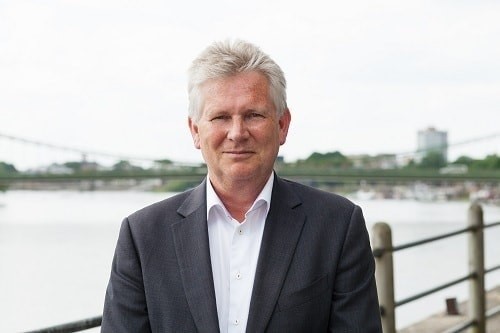Sometimes, when you spend time at a conference, you come away thinking “well, that was eight hours I simply won’t get back!”
Opinion
Time well spent, and a day to remember
This year, I ended our Annual Conference on 14 October with the feeling that I’d not just spent a thoroughly good day with some truly great people, but I was genuinely brimming with ideas and suggestions I wanted to take away and try out, immediately!
As chief executive, you may think I am a tiny bit biased. But I am nothing if not self-critical, and I can honestly say that this year’s conference was both truly memorable and extremely practical.
For me, the message coming through every presentation and session was: put people, their health and wellbeing first if you truly want to succeed, whatever your line of business or work.
 Mike Robinson: "Humour is one of the most effective ways to reach people’s hearts as well as minds."
Mike Robinson: "Humour is one of the most effective ways to reach people’s hearts as well as minds."
Because we live in a world where the ‘human’ element of work and commerce is coming under increasing threat, which in turn puts our wellbeing at risk.
Do you feel frustrated when you must use a self-service till in a shop and the scale doesn’t register your item? How many times every day are you asked to remember which password you used for which ‘smart’ device? Can you feel your blood boil when you’re faced with six more options to reach a call centre and must still endure half an hour of holding music?
Every day, the systems we surround ourselves with to work, shop and do business are clamouring for our attention, and demanding more of us, our time, and our patience. All in the name of progress!
So, the luxury of being able to spend a whole day in a large room at Congress Centre in London engaging with some of the best brains in health, safety and wellbeing, away from the phone and computer, was not lost on me. Such was the enthusiasm and passion with which all our speakers spoke.
Take Col. Dame Kelly Holmes, who shared her story with an honesty and energy which touched everyone in the room. “We are talking about people,” said Dame Kelly. “Not everyone is living their lives in the present or being authentic. Until we have acceptance that we need to talk more openly, we won’t improve wellbeing.”
Or Peter Kelly, the new head of programme at our award-winning mental wellbeing sister charity Mates in Mind, who said: “People’s health cannot be in the too hard category. When is it too much? We need to be preventing mental health problems and we didn’t prepare people for remote or hybrid working. This is the next big problem coming down the track.”
And our own head of wellbeing, Marcus Herbert, who said: “Having a wellbeing strategy in place will help lead to better outcomes.”
What all these comments show is that asking ourselves and each other what it is we need as human beings is the best starting point to ensuring that we thrive.
Only by putting the person at the centre can we build organisations and systems around us which deliver not just what we need but also what helps us to succeed.
When it comes to the climate, or pollution levels in our cities, it’s our health which should be driving our action to reduce emissions – as Dr Maria Neira from the World Health Organization so eloquently said.
When we look at the incredible success that is possible, not just in business but also in sports like Formula One, having an approach which says “blame the problem, not the person” is absolutely the foundation of a team which pulls together and helps each other, meaning they are also more likely to win.
And we need to “speak human” if we’re going to get this across. Which is why Professor Tim Marsh was right to say that humour is one of the most effective ways to reach people’s hearts as well as minds.
Mike Robinson FCA is Chief executive of the British Safety Council
OPINION

A new year, a new approach to risk?
By Mike Robinson FCA, British Safety Council on 02 February 2026
The rulebook is becoming obsolete faster than we can rewrite it. While bureaucracies labour to update yesterday’s regulations, the world of work transforms daily.

Nothing is wrong – until it is: safety in an age of permanent uncertainty
By Dr Julie Riggs, British Safety Council on 30 January 2026
The fast-moving geopolitical, environmental and social landscape is making it increasingly difficult for organisations to identify, predict and plan for emerging safety hazards and risks, making it more important than ever for safety practitioners to spot the early warning signs before serious harm occurs and alert their employer and the global OSH community.

Alcohol – the negative impact on work and workplaces
By Dr Jamie O’Halloran, IPPR on 02 January 2026
New IPPR research shows that most employees expect their employer to play an active role in reducing alcohol harm. Senior staff, in particular, believe employers have an even greater responsibility. Yet in practice, many employees say they do not see their employer taking meaningful steps to minimise harm.



